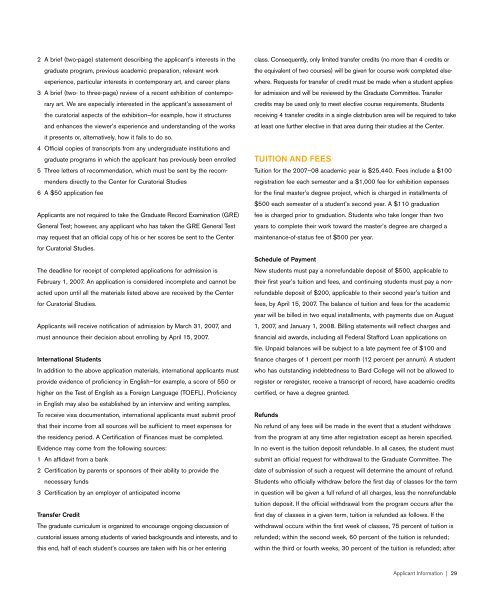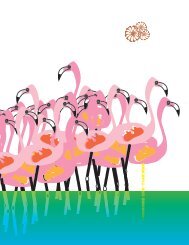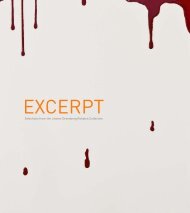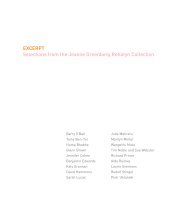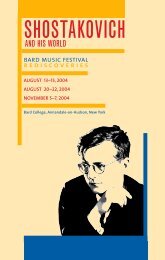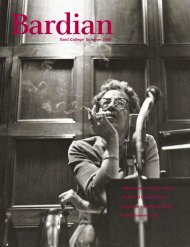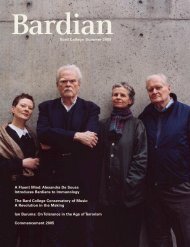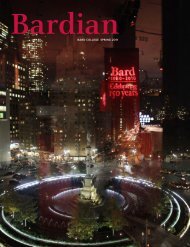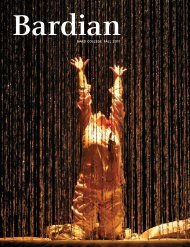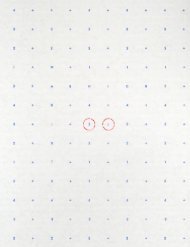CCS CAT INSIDES NEW
Create successful ePaper yourself
Turn your PDF publications into a flip-book with our unique Google optimized e-Paper software.
2 A brief (two-page) statement describing the applicant’s interests in the<br />
graduate program, previous academic preparation, relevant work<br />
experience, particular interests in contemporary art, and career plans<br />
3 A brief (two- to three-page) review of a recent exhibition of contemporary<br />
art. We are especially interested in the applicant’s assessment of<br />
the curatorial aspects of the exhibition—for example, how it structures<br />
and enhances the viewer’s experience and understanding of the works<br />
it presents or, alternatively, how it fails to do so.<br />
4 Official copies of transcripts from any undergraduate institutions and<br />
graduate programs in which the applicant has previously been enrolled<br />
5 Three letters of recommendation, which must be sent by the recommenders<br />
directly to the Center for Curatorial Studies<br />
6 A $50 application fee<br />
Applicants are not required to take the Graduate Record Examination (GRE)<br />
General Test; however, any applicant who has taken the GRE General Test<br />
may request that an official copy of his or her scores be sent to the Center<br />
for Curatorial Studies.<br />
The deadline for receipt of completed applications for admission is<br />
February 1, 2007. An application is considered incomplete and cannot be<br />
acted upon until all the materials listed above are received by the Center<br />
for Curatorial Studies.<br />
Applicants will receive notification of admission by March 31, 2007, and<br />
must announce their decision about enrolling by April 15, 2007.<br />
International Students<br />
In addition to the above application materials, international applicants must<br />
provide evidence of proficiency in English—for example, a score of 550 or<br />
higher on the Test of English as a Foreign Language (TOEFL). Proficiency<br />
in English may also be established by an interview and writing samples.<br />
To receive visa documentation, international applicants must submit proof<br />
that their income from all sources will be sufficient to meet expenses for<br />
the residency period. A Certification of Finances must be completed.<br />
Evidence may come from the following sources:<br />
1 An affidavit from a bank<br />
2 Certification by parents or sponsors of their ability to provide the<br />
necessary funds<br />
3 Certification by an employer of anticipated income<br />
Transfer Credit<br />
The graduate curriculum is organized to encourage ongoing discussion of<br />
curatorial issues among students of varied backgrounds and interests, and to<br />
this end, half of each student’s courses are taken with his or her entering<br />
class. Consequently, only limited transfer credits (no more than 4 credits or<br />
the equivalent of two courses) will be given for course work completed elsewhere.<br />
Requests for transfer of credit must be made when a student applies<br />
for admission and will be reviewed by the Graduate Committee. Transfer<br />
credits may be used only to meet elective course requirements. Students<br />
receiving 4 transfer credits in a single distribution area will be required to take<br />
at least one further elective in that area during their studies at the Center.<br />
TUITION AND FEES<br />
Tuition for the 2007–08 academic year is $25,440. Fees include a $100<br />
registration fee each semester and a $1,000 fee for exhibition expenses<br />
for the final master’s degree project, which is charged in installments of<br />
$500 each semester of a student’s second year. A $110 graduation<br />
fee is charged prior to graduation. Students who take longer than two<br />
years to complete their work toward the master’s degree are charged a<br />
maintenance-of-status fee of $500 per year.<br />
Schedule of Payment<br />
New students must pay a nonrefundable deposit of $500, applicable to<br />
their first year’s tuition and fees, and continuing students must pay a nonrefundable<br />
deposit of $200, applicable to their second year’s tuition and<br />
fees, by April 15, 2007. The balance of tuition and fees for the academic<br />
year will be billed in two equal installments, with payments due on August<br />
1, 2007, and January 1, 2008. Billing statements will reflect charges and<br />
financial aid awards, including all Federal Stafford Loan applications on<br />
file. Unpaid balances will be subject to a late payment fee of $100 and<br />
finance charges of 1 percent per month (12 percent per annum). A student<br />
who has outstanding indebtedness to Bard College will not be allowed to<br />
register or reregister, receive a transcript of record, have academic credits<br />
certified, or have a degree granted.<br />
Refunds<br />
No refund of any fees will be made in the event that a student withdraws<br />
from the program at any time after registration except as herein specified.<br />
In no event is the tuition deposit refundable. In all cases, the student must<br />
submit an official request for withdrawal to the Graduate Committee. The<br />
date of submission of such a request will determine the amount of refund.<br />
Students who officially withdraw before the first day of classes for the term<br />
in question will be given a full refund of all charges, less the nonrefundable<br />
tuition deposit. If the official withdrawal from the program occurs after the<br />
first day of classes in a given term, tuition is refunded as follows. If the<br />
withdrawal occurs within the first week of classes, 75 percent of tuition is<br />
refunded; within the second week, 60 percent of the tuition is refunded;<br />
within the third or fourth weeks, 30 percent of the tuition is refunded; after<br />
Applicant Information | 29


